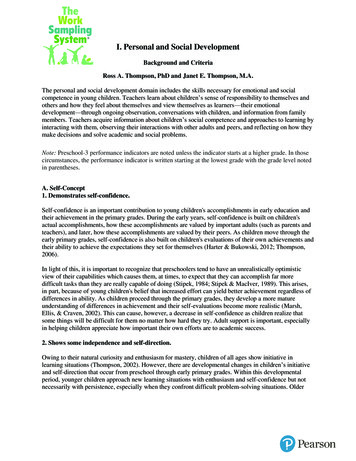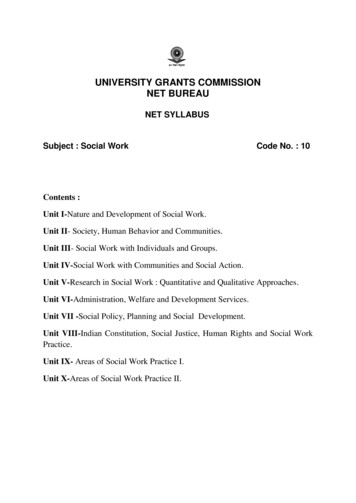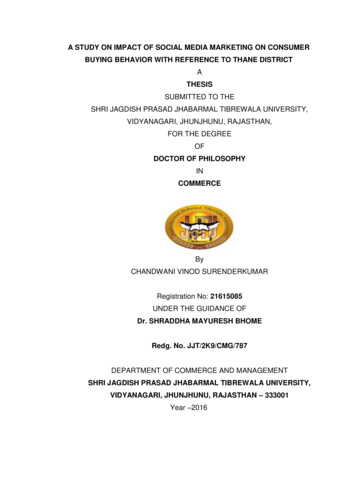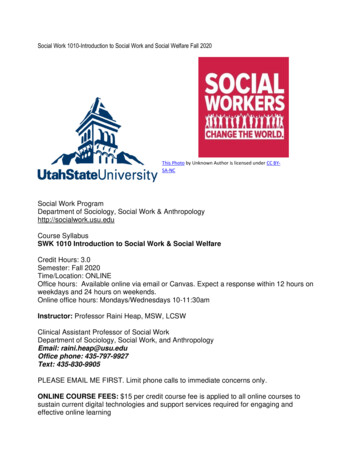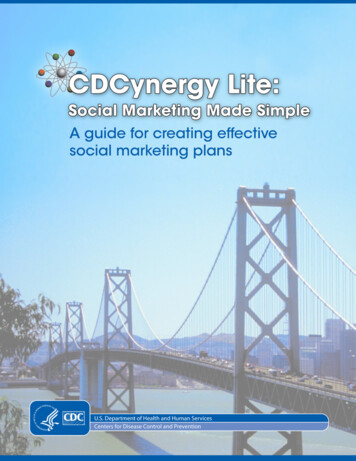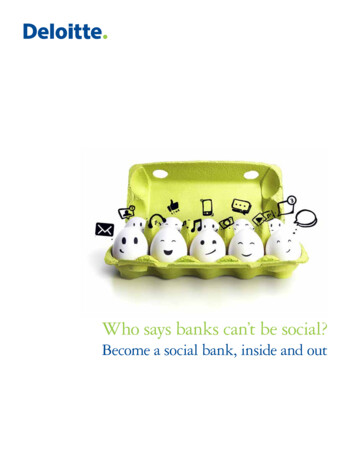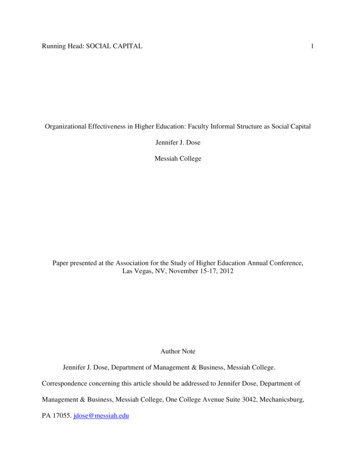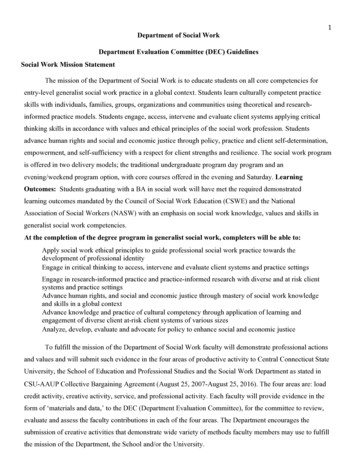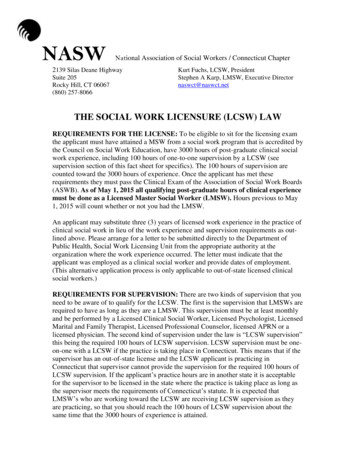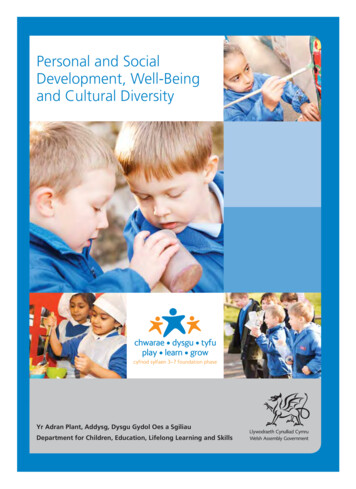
Transcription
Personal and SocialDevelopment, Well-Beingand Cultural DiversityYr Adran Plant, Addysg, Dysgu Gydol Oes a SgiliauDepartment for Children, Education, Lifelong Learning and SkillsPSE cover.indd 11/4/08 15:47:57
Personal and Social Development,Well-Being and Cultural DiversityAudienceHeadteachers, teachers, practitioners, governing bodies of maintainedschools and practitioners and management committees in thenon-maintained sector in Wales; local education authorities; teacherunions and school representative bodies; church diocesan authorities;national bodies in Wales with an interest in education.OverviewThis document provides guidance on the skills and knowledge thatchildren acquire during the Foundation Phase, along with case studieson its implementation in settings and schools. The document and theArea of Learning should not be viewed in isolation, but should beplanned for across the curriculum.FurtherinformationEnquiries about this document should be directed to:Curriculum and Assessment 3–14 DivisionDepartment for Children, Education, Lifelong Learning and SkillsWelsh Assembly GovernmentFloor 10, Southgate HouseWood StreetCardiffCF10 1EWTel: 0800 083 6003Fax: 029 2037 5496e-mail: n be obtained from:Tel: 029 2037 5427Fax: 029 2037 5494Or by visiting the Welsh Assembly Government’s websitewww.wales.gov.ukRef: AC/GM/0846ISBN: 9780750446488PSE cover.indd 2AprilA-EAC-02-01-qA673006/1/AB Crown copyright 200831/3/08 18:05:56
ContentsPSE doc NEW (E).indd 1Background2Introduction4Personal developmentCase study: Caring for the class goldfish, frogspawn and tadpoles5Social developmentCase study: Snuggly SquirrelCase study: Christmas in a country far away8Moral and spiritual inting of MaishaPhysical well-beingCase study: Snack time16Learning to learn/dispositions to learningCase study: Making a scarecrowIndependenceCase study: The sad train20Planning26Progress in learningPersonal developmentSocial developmentMoral and spiritual developmentWell-being28Personal and Social Development, Well-Being andCultural Diversity across the curriculum32The legal and ethical context34Useful information and contacts35Foundation Phase glossary38Acknowledgements441/4/08 11:33:15
BackgroundThe proposals in the Welsh Assembly Government’s document TheLearning Country: Foundation Phase 3–7 years included developinga curriculum that linked and strengthened the principles and practicein ACCAC’s document Desirable Outcomes for Children’s Learningbefore Compulsory School Age (2000) with the programmes of studyand focus statements in the Key Stage 1 national curriculum, tocreate a rich curriculum under seven Areas of Learning for children inthe Foundation Phase. The Foundation Phase curriculum advocatesthat positive links between the home and the providers of care andeducation are fostered and promoted.The Welsh Assembly Government’s approach to education andlifelong learning is set in the broader context of our vision for childrenand young people overall.We have seven core aims for children and young people developedfrom the United Nations Convention on the Rights of the Child. Thesewill underpin all of the activities of the Department for Children,Education, Lifelong Learning and Skills (DCELLS).We aim to ensure that all children and young people: have a flying start in life and the best possible basis for theirfuture growth and development have access to a comprehensive range of education, trainingand learning opportunities, including acquisition of essentialpersonal and social skills enjoy the best possible physical and mental, social andemotional health, including freedom from abuse, victimisationand exploitation have access to play, leisure, sporting and cultural activities are listened to, treated with respect, and are able to have theirrace and cultural identity recognised have a safe home and a community that supports physical andemotional wellbeing are not disadvantaged by any type of poverty.2Personal and Social Development, Well-Being and Cultural DiversityPSE doc NEW (E).indd 231/3/08 17:30:33
This guidance supports the Personal and Social Development,Well-Being and Cultural Diversity Area of Learning in the FoundationPhase Framework for Children’s Learning for 3 to 7-year-olds inWales. The document provides guidance on the skills and knowledgethat children acquire, along with case studies on its implementation insettings and schools. The guidance and Area of Learning should notbe viewed or delivered in isolation; it should be planned for across thecurriculum.Please note that details of the statutory requirements for religiouseducation are on page 13 of the Foundation Phase Framework forChildren’s Learning for 3 to 7-year-olds in Wales. In essence, thecontent of religious education will continue to be set out in the locallyagreed syllabus with advice provided by the local Standing AdvisoryCouncil for religious education (SACRE), or under such arrangementsas are made by a school of religious character.Personal and Social Development, Well-Being and Cultural DiversityPSE doc NEW (E).indd 3331/3/08 17:30:42
IntroductionThis Area of Learning is at the heart of the Foundation PhaseCurriculum 3–7 and should be developed across the curriculum.At the heart of Personal and Social Development, Well-Being andCultural Diversity is the process of experiential learning that is centralto good practice in education for young children. The model: starts with the children’s past or present experience provides an opportunity for children to talk about theirexperiences, including sharing familiar and new culturalexperiences relates learning to the real world allows for new learning and practice of skills reviews the whole process and leads to progression in learning.In Personal and Social Development, Well-Being and Cultural Diversitychildren learn about themselves, their relationships with other childrenand adults both within and beyond the family, the distinctive Welshculture and other cultures that are part of the diverse society in Wales.Concepts of fairness and justice are introduced and children areencouraged to think about and respect the feelings of others. Theimportance of motivation, perseverance, self-esteem and a positivedisposition to learning all have a significant role to play in children’slearning and development within the Foundation Phase.Well-being is an integral part of learning and is associated not only withchildren’s basic needs for safety and security, food and shelter, warmthand affection, but also with how at ease children are with themselvesand their surroundings. It is now recognised that well-being is essentialto becoming an effective learner.4Personal and Social Development, Well-Being and Cultural DiversityPSE doc NEW (E).indd 431/3/08 17:30:42
Personal developmentAs individuals, children should be given opportunities to learn: how to take care of themselves, their personal hygiene and safety the skills of dressing and undressing independence when eating how to respect their environment and use resources constructivelyand with care.This can be achieved through: individual encouragement and support from a practitioner spontaneous and structured learning opportunities mealtimes and snack times (physical) activities in the indoor and outdoor learningenvironments.In structured play activities and through experiences related to theirdaily lives, their families, homes, friends and neighbourhood, childrenwill: learn to interact with others who are similar and different fromthemselves gain awareness that all individuals are of equal value and learn toacknowledge, respect and value individual and cultural similaritiesand differences learn to value the right of individuals to their own lifestyle andbeliefs.Frequent opportunities for children to express and communicatetheir views, feelings and emotions, as well as to listen to others,for example in circle time, will (whether the setting/school ischaracterised by ethnic diversity or mono-ethnicity, and regardless ofwhether the children are from the dominant or minority culture) laythe foundations for and enable children to develop: confidence and assertiveness sensitivity and empathy to the needs of others the ability to challenge stereotypes, prejudice and discriminationrelated to culture, gender or disabilityPersonal and Social Development, Well-Being and Cultural DiversityPSE doc NEW (E).indd 5531/3/08 17:30:42
an understanding that through recognising and challengingnegative views and attitudes racist attitudes can be changed.Opportunities to care for pets and plants will help children to: understand that all living things have similar needs show care and respect for living things.Children develop knowledge, concepts and skills that build on theirpersonal experiences, and equip them for a role in society througha learning environment that reflects each culture appropriately andprovides activities that are suitably planned and resourced.6Personal and Social Development, Well-Being and Cultural DiversityPSE doc NEW (E).indd 631/3/08 17:30:45
The followingcase studydescribes howJack reacted tothe introductionof frogspawn andtadpoles to theclassroom.Caring for the class goldfish, frogspawn andtadpolesIn addition to providing opportunities for Jack to developconfidence and assertiveness and to show concern for livingthings, he also increased his vocabulary and became moreconfident in interacting and talking with other children andpractitioners.Jack’s speech was immature and difficult to understand. He wasreluctant to converse with practitioners in the setting and onlyinteracted with small groups of children. He often spent timealone watching the class goldfish.When frog spawn and tadpoles were brought to schoolJack was fascinated by them. His curiosity led to him askingquestions. Within a few days, Jack was providing daily accountsof their progress to both practitioners and children. He wasgiven the important role of informing the teacher of when hethought each frog was ready to be returned to its pond.This new responsibility, and his natural interest in nature,resulted in Jack becoming more confident in interacting andtalking with other children and practitioners, and there was anoticeable improvement in his speech and vocabulary.Personal and Social Development, Well-Being and Cultural DiversityPSE doc NEW (E).indd 7731/3/08 17:30:46
Social development Initially children’s social development and learning occur withinthe home as they form relationships with members of their familygroup. Learning experiences in the home will be extended when childrenstart to attend settings/schools but they will continue to spendsome of their time in solitary activities, acquiring new skills. When engaged in small group activities, children should have theopportunity to interact with and be supported by a practitionerand should be encouraged to seek help if they need it. As children progress more challenging topics can be introduced inresponse to the children’s interests and growing understanding; forexample, ‘Folk tales and fables’, ‘Being good friends’, ‘Patterns andcolours’. The transition from home to a setting/school will be eased byopportunities for role play in the home corner or other familiarsurroundings, such as a book corner, that are suitably furnishedwith adult- as well as child-sized furniture. Gradually children build up their vocabulary and developconfidence in talking with other children and practitioners aboutthemselves and what they are doing, as well as becoming aware ofand respecting the needs of others. In group settings children may play alone or alongside others,gradually interacting more with their peer group as their languageand communication skills and their friendships develop. When children play happily together in small groups and haveacquired relevant communication skills, activities can be plannedthat require them to solve problems or play games together. Children also need to develop awareness of the consequences oftheir actions, for example that it is wrong to hit others becausethey will be hurt. Opportunities should be made to involve children in devising a setof simple rules for behaviour in their group. Children also need to develop respect for rules and property. The support of a practitioner will still be required until childrendevelop skills in taking turns and observing the rules of a game.8Personal and Social Development, Well-Being and Cultural DiversityPSE doc NEW (E).indd 831/3/08 17:30:46
Children should be encouraged to consider the needs of othersand to participate in caring and sharing activities. Practitioners also need to be sensitive to children’s needs forsupport in developing attention skills. Some children will requirea range of stimuli and routines to gain and maintain theirattention, such as gestures, sounds or visual aids. As children progress they will be able to contribute to a varietyof groups for different purposes and will be able to undertakeroles within those groups, for example re-enacting the parts ofcharacters in a story, or carrying out a mathematical investigation. Children should have opportunities for undertaking collaborativework on large-scale projects that involve considerable interpersonalskills such as cooperative learning, decision making, andundertaking different roles and responsibilities. As children progress they will be able to recognise issues that areof common concern to themselves and to others, such as what isfair and unfair. Children can provide mutual support for each other. They learn toestablish and maintain friendships and how to participate in avariety of groups in the wider community. Children will benefit from opportunities to develop theirunderstanding of different members of the community by learningabout their roles, the different workplaces in the locality. Children should become aware of how they can help to care fortheir environment. The concept of cultural diversity encompasses acceptanceand respect. It means understanding that each individual isdifferent and unique. By providing a safe, positive and nurturingenvironment children will have opportunities to share and explorethese differences. The Curriculum Cymreig should enable all children who live inWales to gain a sense of belonging to Wales, and provide themwith an understanding of the Welsh heritage, literature, arts andreligious background, as well as the language. Children will become aware of their own cultural identity andthat of others through a range of planned, and incidental, practicaleducational experiences. Children will learn to appreciate cultural diversity by sharing andcelebrating familiar and new cultural experiences, including someof the festivals and traditions contained in local anddenominational agreed syllabuses.Personal and Social Development, Well-Being and Cultural DiversityPSE doc NEW (E).indd 9931/3/08 17:30:46
Differences should be acknowledged, discussed, respected andvalued. There will also be similarities, for example most cultureshave rituals (such as family mealtimes and birthdays) with whichchildren are able to identify, although they may celebrate themdifferently. Topics such as ‘Families’, ‘Homes’, ‘Foods’,‘Toys and games’ and ‘Celebrations’ allenable cultural diversity to be developedas they relate to every child’s experiencesin some way. However, focusing solely onspectacular or colourful events such as thismay lead to stereotyping . Knowledge of different aspects of culturecan be developed including dress, language,diet and food, ways of eating, discipline,courtesy, traditions and customs, music, art,dance and literature. Over time children will learn about differentbackgrounds and lifestyles, to respect themequally and appreciate the variedcontributions that different cultures make tocommunities in Wales. Celebrating some of the festivals of major religions providespositive opportunities for learning about different beliefs andcustoms. There may be aspects of culture associated with religions,for example writings, art, music, symbols and architecture. In order to be able to empathise with others children will need toexplore their own personal and cultural identities and feelings,and express their views through play and talk, drawing, paintingand other forms of representation. Issues of fairness, justice, rights and responsibilities can beintroduced when children are able to appreciate the feelings ofothers. In predominantly mono-ethnic settings/schools children’sunderstanding of different cultures can be extended bycommunicating (e.g. via e-mail) with children in other settings withdifferent cultural contexts.10Personal and Social Development, Well-Being and Cultural DiversityPSE doc NEW (E).indd 1031/3/08 17:30:53
I use SnugglySquirrel (a toysquirrel) as a‘magic’ comforterwhen a child isupset – perhapswhen leavingMum, after a fallor an argumentwith a friend,when a child isnot very well, etc.Snuggly SquirrelThis is very effective and seems to help children recognise,express and deal with their feelings more easily. They may comeup and ask for a cuddle with Snuggly Squirrel for a variety ofreasons and then recognise that they can comfort and calmthemselves with some independence. Also, this toy squirrelseems to encourage recognition of feelings and empathy in theother children; I often have requests for Snuggly Squirrel fromchildren on behalf of another child in the class “to make him/her feel better”. It is clearly important that Snuggly Squirrel isonly used for this purpose and so retains his magic powers.Personal and Social Development, Well-Being and Cultural DiversityPSE doc NEW (E).indd 111131/3/08 17:31:02
In this case study,a child’s holidayexperiences areused as a stimulusfor Year 2 childrento considerthe similaritiesand differencesbetween theirlifestyles andthose of childrenin another part ofthe world.Christmas in a country far awayOne January morning, during circle time, Aled excitedly toldthe other children about the Christmas holiday he had recentlyspent visiting some of his family who lived in Australia. It hadbeen a very different experience from Christmas in Wales.The weather had been hot and Aled had spent Christmas dayplaying on the beach, and had enjoyed a picnic as his Christmaslunch. In Wales it had been very cold and we had all enjoyed aroast dinner.The children were fascinated by Aled’s holiday but were alsocurious to know if his cousins had a Christmas tree, and ifthey gave presents and cards to their family and friends. Somechildren wanted to know how far it was to Australia and sothey went to look in our book of maps. As the children were sointerested in the discussion I decided to join them.I started to highlight the similarities between Wales andAustralia as much as possible and made a list of statementsfor the children to sort into ‘same’ or ‘different’ categories, forexample ‘Children enjoy playing with their friends’ would be putin the ‘same’ category; ‘Australia is a large country’ would be anexample of ‘different’.Next I invited the children to come up with statements of theirown. After some practice, two large pieces of sugar paperwere put up in the classroom to which the children added theirstatements. Which list would be longer? At the outset, thechildren thought that the ‘different’ category list might turn outto be longer, but it was demonstrated that there were, in fact,more similarities than differences.12Personal and Social Development, Well-Being and Cultural DiversityPSE doc NEW (E).indd 1231/3/08 17:41:31
Other discussion points could include that in Australia: boys and girls enjoy playing games children must bring their own pens to school little girls enjoy wearing pretty dresses children help around the house friends help each other people love to have fun children love animals.Personal and Social Development, Well-Being and Cultural DiversityPSE doc NEW (E).indd 131331/3/08 17:31:06
Moral and spiritual development Children discover some of the boundaries for behaviour(what they are/are not allowed to do) and what is acceptableby observing positive behaviour and attitudes of others. Sometimes expectations in a setting/school may not be consistentwith those at home but children need to learn the reasons forparticular conduct. Ultimately, the aim is that children will be able to communicateabout what is good and bad, right and wrong, fair and unfair,caring and inconsiderate themselves and exercise self-control.It is important when praising or reprimanding behaviour that theapproval or disapproval is clearly directed at the act and not thechild. Learning to empathise with others firstly necessitates theability to recognise their own feelings and reflect on them. The practitioner provides an important role model for the kind ofbehaviour expected in different situations. Spiritual development is less easily defined than moraldevelopment, as the innermost thoughts are involved. Children can be provided with opportunities to experience andrespond to quiet and still times. They should be encouraged toobserve and reflect on natural phenomena (such as autumncolours, or shadows), close their eyes and listen to sounds aroundthem (such as birdsong or classical music), or just be very quiet andthink of something they think is beautiful. All responses should berespected and valued. Values can be developed by giving children opportunities to sharetheir ideas about things that are important to them or somethingthey are pleased about in a piece of work they have done. Circle time is an ideal way of enabling children to take turns atspeaking in a group situation and to listen to each other’s ideas.Collective worship is another opportunity for sharing beliefs andideas. Special times such as birthdays and religious occasions can becelebrated by creating a special atmosphere to make the eventmemorable, for example by using candles and music.14Personal and Social Development, Well-Being and Cultural DiversityPSE doc NEW (E).indd 1431/3/08 17:31:11
Personal and Social Development, Well-Being and Cultural DiversityPSE doc NEW (E).indd 151531/3/08 17:31:24
Well-BeingSelf-identity/self-esteem In order to feel happy about who they are and how they fit intogroups, children need to develop self-awareness as individualsand as part of wider society. This will include self-esteem,self-knowledge, confidence, feeling valued and accepted byothers, an ability to express their views and feelings and makesense of them, and an ability to relate to others and work withthem. Circle time is a familiar way of introducing into discussion mattersrelated to feelings and reactions, beliefs and personal views.Children can be encouraged to respond to photographs, puppets,dolls and story characters. They should have opportunities toexplore aspects of their own and others’ personal and culturalidentity and begin to question stereotyping. Young children need to acquire positive attitudes and so it isimportant to convey positive messages that show that every child isvalued and respected. Children will begin to develop a sense of identity if they can seethemselves in mirrors and photographs in a variety of activities. Children will begin to develop a sense of belonging as they interactwith others in their family, their friends and members of the localcommunity. This includes developing awareness of the culturalheritage of Wales and beginning to speak Welsh. Topics such as ‘All about me’ or ‘Myself’ enable children to exploreidentity, similarities and differences, as well as to discuss likesand dislikes, favourite foods, customs, etc. They can learn aboutdifferent names, observe visual differences by producing andcomparing self-portraits, paying attention to detail, individuality,what is special about each of them. If children feel safe and secure, without fear of failure or criticism,they will be able to benefit from the learning experiences providedfor them by venturing into new activities, making decisions, takingnecessary risks and developing increasing control over their ownlives. Children should know about the importance of food and waterto their bodies, how to make healthy food choices and theimportance of exercise.16Personal and Social Development, Well-Being and Cultural DiversityPSE doc NEW (E).indd 1631/3/08 17:31:25
Painting of MaishaThis painting bya child, based ona character froma book, reflectsthe positiveattitudes andacceptance ofothers that shehas acquired.Children were painting characters from their favourite stories. Thecharacters were multiracial and children were asked to choose one.A child told me she wanted to paint Maisha, an African girl, becauseshe looked pretty.Personal and Social Development, Well-Being and Cultural DiversityPSE doc NEW (E).indd 171731/3/08 17:31:28
Physical well-beingPhysical well-being focuses on children’s increasing awareness oftheir own bodies and their personal health development, includingnutrition and personal safety.Children will need to learn how to keep themselves physically safeand healthy. Their learning programme should include informationabout: what to do or to whom they should go if they feel unsafe or needassistance the importance of food and water to their bodies the importance of healthy eating and how to make healthy foodchoices that include the foods that should feature in a balanceddiet the importance of exercise road safety, water safety and hazards in the home the different parts of the male and female body and the distinctionbetween appropriate and inappropriate touching medicines that are taken to make them feel better, and thedangers of drugs, smoking, alcohol and other dangeroussubstances.18Personal and Social Development, Well-Being and Cultural DiversityPSE doc NEW (E).indd 1831/3/08 17:31:31
This case studydescribes howchildren in thenursery andreception class areactively involvedin afternoonsnack time.Snack timeParents/carers were concerned that their children were noteating lunch, as they were ravenous when they arrived homeafter school. I assured parents/carers that their children did eatlunch but that from 12 noon until 3.30 p.m. was a long andbusy afternoon. I proposed snack time to the parents/carersand then the children; all seemed very positive and enthusiasticabout it.Children pay 1 per week and have the choice of cereal,crackers, cheese, fruit/vegetables each day.The children take part in preparing some of the fruits, handingout cups and plates, and then choosing what they want to eat.They also take responsibility for clearing away their own dishesby washing and drying them.Afternoon snack time takes 20 minutes and is taken beforeafternoon play. It seems to maintain the children’s energy levelsand keeps them alert through the rest of the day. They havetried different sorts of food including fruits/vegetables that werepreviously untried or disliked.Personal and Social Development, Well-Being and Cultural DiversityPSE doc NEW (E).indd 191931/3/08 17:31:35
Learning to learn/dispositions to learning Children are naturally motivated to learn by curiosity and a desireto explore and discover more about their environment, initiallyin a physical way and, as their language develops, through askingquestions and talking about their experiences. Children readily acquire skills in using information andcommunication technology (ICT) and should be providedwith a programme of taught skills and opportunities to use ICTindependently. The skills of enquiry, questioning and information seeking shouldbe nurtured and developed as tools for lifelong learning. If activities are suitably challenging, but not too difficult,they will engage children’s interest, as will be evident in children’sconcentration and perseverance to achieve new skills and explorenew opportunities. Learning how to learn, and both adapting learning to and tacklingnew situations and experiences in a non-threatening environmentwill establish long-lasting skills that will enable children to progressand adapt to the continually changing demands of society. When activities are suited to their needs and interests children willbe relaxed, enjoy learning, and be motivated and involved in whatthey are doing. Positive dispositions to learning, which are influenced by children’sfeelings, rely on children wanting to learn because they find theirlearning experiences intrinsically rewarding. This has implicationsfor the teaching approaches used and the practitioner’s sensitivityto children’s interests, their developing knowledge, understandingand skills. Observation of children’s well-being and their involvement in theprocess of learning will indicate how well learning activities arematched to children’s developmental level. Professor Laevers of the Leuven Centre for Experiential Education,Belgium introduced the term ‘involvement’ to describe children’sdeep level of concentration when learning activities meet theirneeds.20Personal and Social Development, Well-Being and Cultural DiversityPSE doc NEW (E).indd 2031/3/08 17:31:39
Personal and Social Development, Well-Being and Cultural DiversityPSE doc NEW (E).indd 212131/3/08 17:31:52
The followingcase studyillustrates how amixed group ofYear 1 and Year 2children becameengaged in theirlearning.Making a scarecrowThe activity began with a story about a scarecrow. The childrenwere so enthusiastic about the story that several of themimmediately asked if we could make our own scarecrow. Wefound a shirt that had been used as a painting apron and someold trousers from lost property. We discussed what material wecould use to stuff him with, took another look at the book, anddecided to use autumn leaves collected from outside. We tookguesses about how many bucketfuls of leaves we
Personal and Social Development, Well-Being and Cultural Diversity 7 . PSE doc NEW (E).indd 8 31/3/08 17:30:46 Social development Initially children’s social development and learning occur within the home as th
